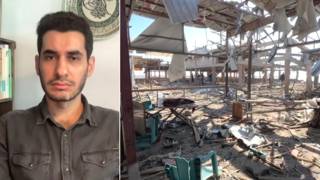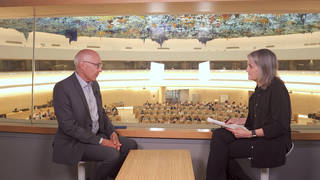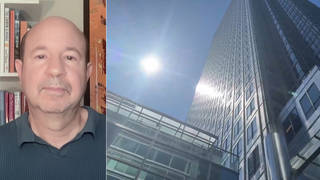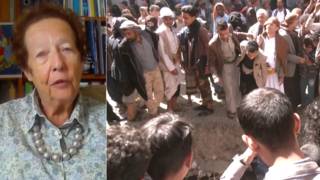
Guests
- Shireen Al-AdeimiYemeni scholar, activist and an assistant professor at Michigan State University.
As the coronavirus spreads in Yemen, where the population already devastated by the world’s worst humanitarian crisis faces growing hunger and aid shortages, the Saudi-led, U.S.-backed coalition continues to drop bombs in the country. We speak to Yemeni scholar Shireen Al-Adeimi, who calls the ongoing crisis “Trump’s war.” “We’re seeing death rates that are just astronomical,” Al-Adeimi says. “The war continues, the bombing continues, the blockade is still enforced.”
Transcript
AMY GOODMAN: We begin today’s show in Yemen, where UNICEF is warning children face deadly hunger and shortages as the COVID-19 pandemic spreads through a country that already faces the world’s worst humanitarian crisis. This comes as medical workers say a U.S.-backed, Saudi-led bombing raid on a residential neighborhood in northern Yemen Wednesday killed 25 civilians and critically injured nine others. A local doctor treated several injured children.
DOCTOR: [translated] The only injured victims are all children. We received three or four people and eight martyred women and children. And today is a painful and sad day for the free Yemeni people.
AMY GOODMAN: The Yemen Data Project estimates the Saudi-led coalition has carried out more than 21,000 airstrikes in five years of war, killing more than 8,700 civilians. Most of the raids were carried out with weapons sold by the United States, and they haven’t stopped even amidst the global pandemic.
Meanwhile, the United Nations is warning of a looming environmental disaster in the Red Sea, where a stricken oil tanker has been abandoned off Yemen’s coast since the war began five years ago, the vessel loaded with more than a million barrels of crude oil — four times as much oil as spilled from the Exxon Valdez off Alaska in 1989. U.N. Humanitarian Affairs and Emergency Relief Coordinator Mark Lowcock said Wednesday a spill would directly affect 1.6 million Yemenis.
MARK LOWCOCK: Essentially every fishing community along Yemen’s west coast would see their livelihoods collapse and would suffer substantial economic losses. About 90% of people in these communities already need humanitarian assistance.
AMY GOODMAN: All of this is happening as the U.S.-backed Saudi bombing campaign in — Yemen has been devastated by conflict, leaving millions of people without access to proper healthcare, clean water or sanitation.
For more, we’re joined by Shireen Al-Adeimi, Yemeni scholar, activist and assistant professor at Michigan State University.
Welcome back to Democracy Now! It’s great to have you with us, Professor Al-Adeimi. Can you start off by talking about the situation of the coronavirus and Yemen right now, a country devastated by the U.S.-backed Saudi bombing?
SHIREEN AL-ADEIMI: Thank you for having me back.
The situation, as you said, is dire. I know I’ve said this before, but every time I come on the show, it just seems to be getting worse. And the reason is because the war continues, the bombing continues, the blockade is still enforced.
And so, with coronavirus, initially there weren’t a lot of cases. There weren’t any recorded cases until April. But ever since then, it’s starting to wreak havoc, and we’re seeing death rates that are just astronomical. We’re seeing 30% — nearly 30% death rates from coronavirus in the cases that have been documented in Yemen, which is, of course, very difficult to do, given the healthcare crisis and the ongoing blockade and the shortage of medicine and fuel and all the things that are needed to keep hospitals functioning.
AMY GOODMAN: I want to turn to the Yemeni epidemiologist Ehab Alsaqqaf, who was speaking to the BBC.
EHAB ALSAQQAF: [translated] The medical team knew this was COVID-19, but the authorities didn’t announce it. But then the cases started to increase rapidly. The next day, there were 17 confirmed cases; the day after, another 22. Then we started hearing that people were dying in their homes.
AMY GOODMAN: Professor Shireen Al-Adeimi, you are here, in Michigan, where you teach. Your family remains in Yemen. How are they doing in the midst of this pandemic?
SHIREEN AL-ADEIMI: I mean, there’s not much that they can do, given that their livelihoods depend on — you know, those of them who are still able to work still have to go out and work. If you’re talking about, for example, protecting themselves with masks, they try to do what they can, but, you know, it’s not easy to purchase these things.
There’s a lot of misinformation. People are just not sure: Should they be taking precautions? Is this really happening? You know, as the interviewee just said, they were certain that this was happening, but they weren’t being announced. So people are still unsure about what’s happening, but they’re also not able to kind of take the precautions that we’re able to take — many of us are able to take here.
For example, there’s 17 million people in Yemen. That’s about 56% of the population doesn’t have access to clean water. This is drinking water. So, how are they going to use soap and water to wash their hands frequently? We have 3, 4 million people who are internally displaced, that are in camps. How are they going to social distance? Where are they going to get water? Where are they going to get food? You have 80% of the population that’s immunocompromised because they’re hungry. And so, you know, this isn’t a country that’s able to take any kind of precautions.
So, people are confused. They know that a lot of people are dying around them. We’ve heard of many people and, you know, friends — my parents were professors at Aden University., and we received a list of all of these people who died. Many of them were their former colleagues. We don’t know for sure if it was because of coronavirus or not, but chances are, you know, it’s either coronavirus or one of the many outbreaks that are currently plaguing the Yemeni healthcare system.
AMY GOODMAN: Are your family members — are any sick with COVID?
SHIREEN AL-ADEIMI: We did have a few family members who — again, they weren’t tested, because they can’t really get tested. But the symptoms seem to be coronavirus symptoms. So far, they’ve recovered, but, you know, we’re still keeping in touch with them. And there’s very little anybody can do.
AMY GOODMAN: Can you talk about the U.S.-backed Saudi bombing campaign? Is it still going on through the pandemic? And what have been the U.S. measures that have been taken or not taken?
SHIREEN AL-ADEIMI: Here’s the really frustrating thing, Amy. All of this is happening, and the U.S. is still helping the Saudis and the Emiratis drop bombs in Yemen. Two days ago, you know, 16 people were killed in an airstrike, and mostly women and children. Two days before that, 11 people were killed in an airstrike. And so, the airstrikes are still ongoing. The blockade is still ongoing. And this is in the middle of a pandemic. And, you know, I can’t imagine a country that has it worse than Yemen currently. It was the world’s worst humanitarian crisis before COVID, and because of the U.S.'s intervention, and now it's even worse than that.
And so, there is a fuel crisis, where people aren’t — you know, they’re queuing for fuel from sunrise to sunset, and often they’re still not able to get any fuel. The fuel, of course, is needed to run the generators, the water pumps, the ventilators, the very few hundred ventilators that remain in the country. And so, this will be absolutely catastrophic. And it’s all because of the root cause, which is this ongoing bombardment of Yemen and the ongoing blockade that’s enforced by the Saudi-led coalition.
AMY GOODMAN: So, President Trump vetoed legislation last year, bipartisan legislation, that sought to bring U.S. complicity in the war to an end. What do you think Congress should be doing right now?
SHIREEN AL-ADEIMI: It took Congress four years to pass that legislation, which is, frankly, unacceptable, given that they all agree that this was an unconstitutional war. This started, of course, by Obama — with Obama and continued into the Trump presidency. And four years later, it was great that we had this bipartisan bill. It was vetoed, but, you know, the role of Congress shouldn’t end right there. It was predicted that Trump was going to veto this, of course. He had spoken publicly about his support for the Saudi-led coalition because of all the contracts for the weapon — you know, for the defense industry here.
But, you know, Congress still has the authority to declare war. And I don’t think that they should be giving up. We haven’t had any kind of debate on Yemen for a year and a half, since this bill was passed. And so, I would urge them to introduce legislation that continues to challenge this. There are ways to introduce legislation that is veto-proof. And that’s what — they have to keep going. This can’t be an issue that is discussed for a very short period of time and then forgotten about, because the suffering is just unbelievable. And we’re going to have millions of people dead before, I think, anybody wants to do anything about it, and then it’s going to be too late.
AMY GOODMAN: There’s been a lot of blame on migrants passing through Yemen, that they’re bringing COVID-19 in, without discussing the devastation that the bombing, the constant bombing, of Yemen has caused, such a destruction of the infrastructure.
SHIREEN AL-ADEIMI: Absolutely. I mean, there is no infrastructure to speak of. Half the hospitals have been bombed. The other half are barely functioning, at 10% capacity. The blockade is preventing important medicine from entering the country. There’s a shortage of personnel. The Health Ministry hasn’t been able to pay people for two years, and so people are volunteering in these hospitals.
And, you know, like, migrants, of course, they’re the most vulnerable situation, the most vulnerable situation, because if you have to cross into Yemen to get to your destination, that’s a very awful thing to have to do. And before the war, of course, Yemen was home to many migrants, hundreds of thousands of migrants from East Africa, and vice versa.
But the situation right now is dire for everybody. And, you know, we can’t talk about these things in isolation. The root cause here is that Yemen is under occupation, it’s under bombardment, it’s under a blockade that’s killing a child every 10 minutes, at least, for the last five years from preventable illnesses, like cholera, diphtheria, dengue fever. A child could die from a simple fever because there’s no medicine to relieve that fever. Children are starving to death because there’s no food, there’s no water. And so, we really have to be talking about the root causes, and not think about all of these as isolated incidents.
AMY GOODMAN: And the problem of people already grappling with diphtheria, dengue, cholera in Yemen?
SHIREEN AL-ADEIMI: Absolutely, and H1N1. And so there are four outbreaks that are currently stressing the whatever remaining healthcare system is in Yemen. And now add on top of that cholera — or, sorry, coronavirus, and there’s really no way to track it, to treat it, to supply people with the kinds of medicines that they need. There’s only 300 ventilators in the entire country of 30 million people. And so, what are people going to do? They just expect that they’re going to die from whatever disease is going to come at them next.
AMY GOODMAN: So, your message to lawmakers here in the United States and to the world, Professor Al-Adeimi?
SHIREEN AL-ADEIMI: It’s really time to take back responsibility and for people to be held accountable for this. This is Trump’s war. And this is Congress’s doing, if they continue to stay silent while he is perpetuating this violence against Yemenis. And the countries like Canada or France or the U.K. or Germany, all of these countries are benefiting still from the sale of weapons to the Saudis and Emiratis. You know, you can’t go and say, “Well, we want peace in Yemen,” when you are actively profiting from the war in Yemen or participating in the killing of civilians in Yemen. And so, I think Yemenis feel like the international community has let them down, absolutely let them down. But it’s really time to stop blaming people who are occupied, and think about the people who are occupying them and bombing them and starving them to death. And it’s time to put an end to all of that.
AMY GOODMAN: Shireen Al-Adeimi, I want to thank you for being with us, Yemeni scholar, activist, assistant professor at Michigan State University in East Lansing.
Next up, “It’s Time to Tell a New Story About Coronavirus — Our Lives Depend on It.” That’s the headline of a new piece by science investigative journalist Sonia Shah. Stay with us.
[break]
AMY GOODMAN: Yemeni artists singing at home as part of the social media campaign #RemoteYeminiArt.













Media Options